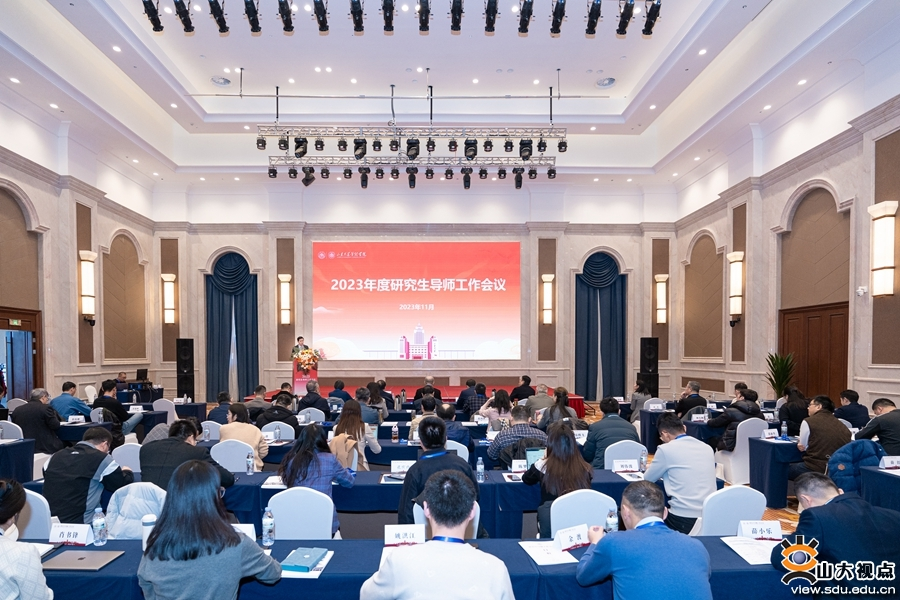From November 17th to 19th, the Graduate Education Center of the School of Management held the 2023 Graduate Supervisors Meeting. Li Yuan, Chair Professor of Shanghai Jiaotong University, Qian Xiaojun, Vice Dean of Schwarzman Scholars, Tsinghua University, Li Ning, Operation Director of Research Division, China National Knowledge Infrastructure (CNKI), Zhang Hengxu, Vice Dean of the Graduate School and Deputy Director of the Graduate Working Department of the Party Committee of Shandong University, Wang Biao, Director of the Graduate Recruitment Office of the Graduate Working Department of the Graduate School and the Party Committee of the University, Zheng Bin, Director of the Graduate Education Office for Professional Degree of the Graduate School and the Party Committee of the University, Yang Jiangang, Vice Dean of the School of Literature, Fan Rui, Director of Student Mental Health Education and Counseling Center, Wu Changqi, Dean of the School of Management, Meng Qingchun, Secretary of the Party Committee of the School, and other leaders were present at the meeting. The meeting was hosted by Zhang Jianghua, Vice Dean of the School of Management.

Zhang Hengxu stressed that the Graduate Supervisors Meeting is an important way to strengthen the construction of the supervisor team and deepen the reform of graduate education. Supervisors should actively explore new cultivation methods and promote the quality and efficiency of the School’s graduate education, continuing to empower the high-quality development. Wu Changqi hoped that all supervisors would cultivate more and better management elites for the country with a strong sense of responsibility and enterprise.
In the report session, Zhang Hengxu takes “playing the supportive role of the supervisor team to build the top talents cultivation system with Shandong University characteristics” as the title to start a report in three aspects: the historical mission of graduate education in the new era, the supportive role of the supervisor team, and the construction of top innovative talents cultivation system. He said that management science plays an important role in the cultivation of high-level innovative talents, and supervisors should deeply grasp the new positioning of cultivation and cultivate “the most creative graduates” for the country.
With the title of “Strengthening Discipline Construction and Improving the Quality of Student Cultivation”, Li Yuan talked in detail about the common problems in business schools and the ideas to solve the problems in the student cultivation and shared his experience in the management of graduate education.
With the title of “Introduction to the Management of Graduate Education in the School of Literature”, Yang Jiangang introduced the enrollment situation, the student structure data, the relevant system of graduate training, the representative initiatives, and the quality of doctoral training in the School of Literature, and put forward instructive and practicable professional suggestions on the graduate talents cultivation and the high-quality development.
Qian Xiaojun had in-depth communication with the supervisors on “Professional Degree Graduate Cultivation and Dissertation Writing Standards”. She said that the graduate training of a professional master’s degree education program should not only meet the academic standards, but also face the realistic needs of national development and rejuvenation, and should pay attention to the important role of goal orientation in the process of school running, clearly formulate the cultivation objectives, and be committed to delivering excellent management practice-oriented talents to the society.
Zhang Jianghua, with the title of “Exploration and Work Ideas of Graduate Cultivation in the School of Management”, introduced the overview of graduate cultivation, innovative initiatives, cultivation results, and the future work ideas of the School, and indicated to further strengthen the management of supervisor positions and improve the supervision and management mechanism by the requirements of the University and the School to ensure the quality of talent cultivation.
Wang Biao made a keynote report on the topic of “Introduction to Graduate Enrollment” based on four aspects: types of graduate enrollment, enrollment methods, enrollment plan, and new trends in enrollment, and put forward three suggestions: improving the development quality, expanding resources inside and outside the University, and strengthening the standardized management.
Combining specific examples, Fan Rui, with the title of “Psychological Literacy and Stress Relief for Graduate Supervisors”, analyzed the root causes of graduates’ psychological problems, the performance and characteristics of common psychological problems, and put forward the principles of early identification, early intervention, early treatment, and early reporting. She emphasized that the supervisor is not only the academic advisor of the graduates but also the guide to their physical and mental health development.
Li Ning gave a detailed introduction on the topic of “Strictly Abiding by the Norms of Research Integrity and Helping Supervisors Provide Efficient Supervision” from the three aspects of institutional safeguard for academic ethics, common manifestations of academic misconduct, and information technology means to assist in regulating the graduate cultivation process in schools and universities, so as to help supervisors better supervise the dissertation and ensure the graduates’ dissertation quality.
On the morning of the 19th, Zheng Bin gave a keynote report on “Accelerating the Cultivation of High-level Applied Innovative Talents”, focusing on “Comprehensively developing professional degree graduate education in a targeted direction”, “Promoting the integration of industry and education in a higher quality”, and “Serving the urgent needs and carrying out the cultivation of excellent engineers with organized research”. Supervisors conducted discussions on topics such as revision of the 2024 cultivation program, supervisor team construction, industry supervisors and professional internships, specification of professional dissertation writing, duties of degree programs and project leaders, etc. Teachers focused on major theoretical and practical issues in the graduate education development of management disciplines in the new era and put forward opinions and suggestions accordingly. Meng Qingchun made a concluding speech, stressing the need to establish moral education, focus on problem orientation, strengthen humanistic care, and build a harmonious relationship between supervisors and students.
More than 70 graduate supervisors from the School attended the meeting.